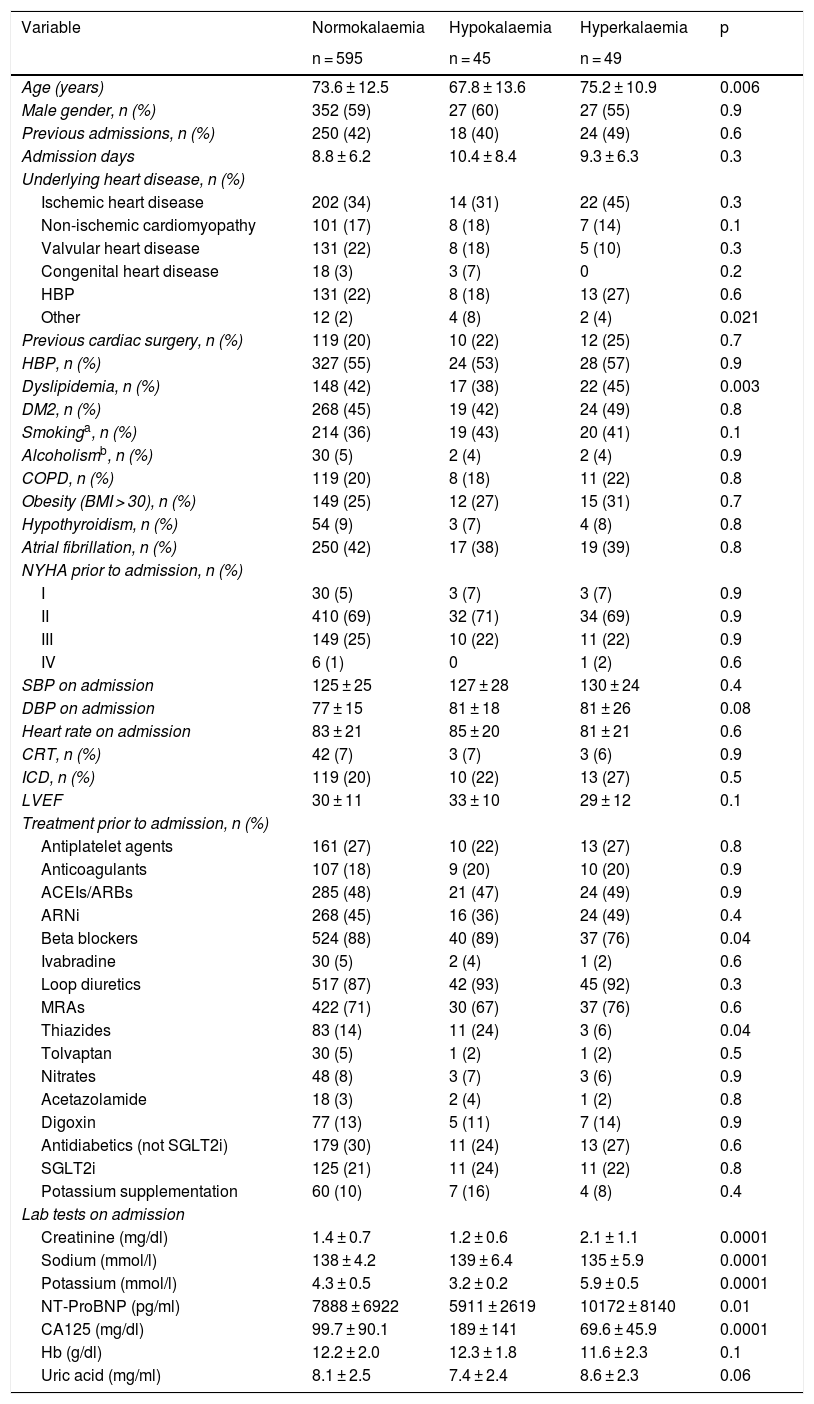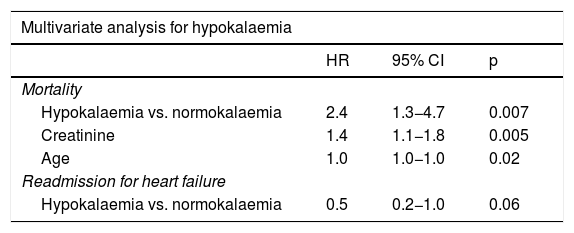Potassium alterations constitute a major clinical problem in decompensated heart failure (HF). This study aims to assess the prognostic implications of hypo and hyperkalaemia on admission for acute HF in cardiovascular mortality and hospital readmissions.
Material and methodFrom January 2016 to June 2020, 1,397 cases with a diagnosis of acute HF were admitted. Admission programmed for study, elective therapies, and patients with LVEF >40% were excluded. The study was carried out on 689 patients, 45 with K+ <3.5 mmol/l, 49 K+ >5.0 mmol/l and 595 K+ 3.5–5.0 mmol/l. Medical history, baseline clinical profile, drug therapy, and potassium levels obtained upon admission were analysed.
ResultsAnnual mortality due to hypokalaemia (K+ <3.5 mmol/l) was 37.8% (HR 2.4: 95%CI 1.3−4.7; p < 0.007); for hyperkalaemia 40.8% (HR 1.9: 95% CI: 0.98−3.51; p < 0.055). Creatinine level and age were variables associated with mortality in both the hyperkalaemic and hypokalaemic cohorts. Hospital readmissions did not show statistical association with these electrolyte disorders.
ConclusionsIn patients admitted for decompensated HF, both hyperkalaemia and hypokalaemia determined at admission have a negative prognostic impact on survival. Creatinine and age are other independent factors associated with mortality. The effect on the probability of hospital readmission at one year is not demonstrated in this study.
Las alteraciones del potasio constituyen un problema clínico de gran magnitud en la insuficiencia cardíaca (IC) descompensada. Este estudio pretende valorar las implicaciones pronósticas de la hipo e hiperpotasemia al ingreso por IC aguda en la mortalidad cardiovascular y reingresos hospitalarios.
Material y métodoDe enero del 2016 a junio del 2020 fueron ingresados 1.397 casos con diagnóstico de IC aguda. Se excluyeron ingresos programados para estudio, terapias electivas y pacientes con fracción de eyección del ventrículo izquierdo (FEVI) >40%. El estudio se realizó sobre 689 pacientes, 45 con potasio (K+) <3,5 mmol/l, 49 K+ >5,0 mmol/l y 595 K+ 3,5−5,0 mmol/l. Se analizaron los antecedentes, perfil clínico basal, terapia farmacológica y niveles de potasio obtenidos al ingreso.
ResultadosLa mortalidad anual por hipopotasemia (K+ < de 3,5 mmol/l) fue 37,8% (HR 2,4: IC95% 1,3–4,7; p < 0,007); para hiperpotasemia de 40,8% (HR 1,9: IC95%: 0,98−3,51; p < 0,055). El nivel de creatinina y la edad fueron variables asociadas a mortalidad, tanto en la cohorte de hiperpotasemia como en la de hipopotasemia. Los reingresos hospitalarios no mostraron asociación estadística con estos trastornos electrolíticos.
ConclusionesEn los pacientes ingresados por IC descompensada, tanto la hiperpotasemia como la hipopotasemia determinadas al ingreso, tienen impacto pronóstico negativo en la supervivencia. La creatinina y la edad son otros factores independientes asociados a mortalidad. El efecto sobre la probabilidad de reingreso hospitalario al año no se demuestra en este trabajo.












